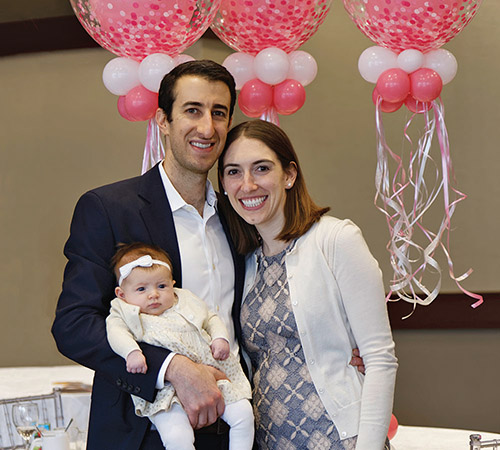

When Hillary Khodari of Englewood learned she was expecting a baby girl, she knew she wanted to celebrate the birth with family and friends. “There is a tendency when you have a girl that you don’t know what to do, and that can be a negative,” said Khodari. “But you can take it as a positive to do whatever you want. People in general want to celebrate happy things and they are happy to celebrate with you.”
The Khodaris had a two-part celebration: a shalom bat (welcoming a girl) on the Friday after the baby was born, hosted by friends after Shabbos dinner, and a simchat bat (celebrating a girl) two months later. For the party, Khodari had a catered dairy brunch at Englewood’s Congregation Ahavath Torah on Sunday morning, complete with a magician to entertain the children. Both Hillary and her husband, Joey, talked about where the baby’s name came from and gave a dvar Torah.
A bris for a baby boy is always on the eighth day, health permitting, and a seudah follows. The only ritual required for a girl is to name her when the Torah is read, usually on the day closest to the birth.
Rabbi Mordy Kuessous, assistant rabbi for the Benaroya Sephardic Center at Congregation Ahavath Torah in Englewood, said many people are now choosing to have a more formal ceremony in shul known as the Zeved Habat (gift of the girl) along with the naming when the Torah is read, on the day closest to the birth or on Shabbat morning. “It is an expression of gratitude for the delivery of a healthy child and an opportunity as a family to express it publicly,” he said. Prior to announcing the name, the rabbi and baal korei read pesukim from Shir Ha Shirim and the father has an aliyah.
Rabbi Chaim Poupko of Ahavath Torah said that the Zeved Habat began in the Sephardic community and has become popular in the Ashkenazi community as well. The practice gained more popularity in Orthodox Judaism when Rabbi Jonathan Sacks included the ceremony in the lifestyle section of the Hebrew-English edition of the Koren Siddur, which he edited, in 2009.
Rabbi Poupko said his parents made a Zeved Habat for his younger sister in 1983. When his daughter was born last year, he included the ceremony at her naming. “We did the naming as part of the Zeved Habat at the end of davening,” he said. “We put tunes to the prayers and it was very meaningful. For those who want to see women included more within the boundaries of halacha, this is a way to honor that interest.” A simchat bat party can also include readings from the Zeved Habat, he said. “It gives a party some spiritual and religious meaning to have the prayers recited.”
A kiddush in shul when both mother and baby can be there is another good way to celebrate. That’s what Aliza and Gary Liebman of Englewood did when their baby was two months old. The Liebmans named the baby on Shabbos, the day after she was born, but waited to make a kiddush until both mom and baby could also come to shul to celebrate.
By Bracha Schwartz
�










